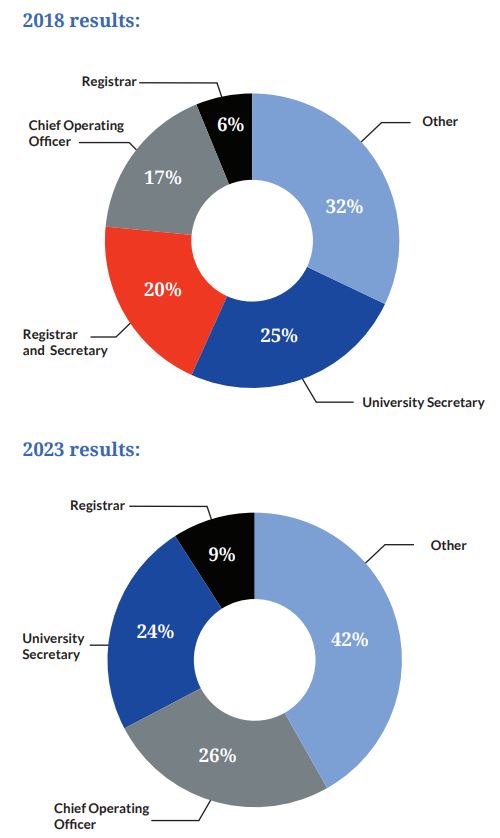Registrars and all that they do
Paul Greatrix, Registrar at the University of Nottingham, discusses our latest report: The Role of the Registrar, which draws comparisons and explores differences with our 2018 survey.

Over the years there have been a few studies of VCs and academic leaders looking at their careers, background, values and standing within institutions. Undertaken by SRHE and HEPI among others, these have covered the career trajectories of senior professional leaders in contemporary universities and how they describe their professional identities, expertise and capabilities. Taking a lead from these, back in 2017 I did a really simple survey on the tenure of registrars and COOs within UK universities and published a short blog on the AHUA website about the responses received.
Having done this piece of work it soon became clear that many AHUA members (and a few others) were interested in learning more about the different roles and responsibilities of registrars, COOs and others. Building on this AHUA therefore decided to survey its membership more fully to reveal the realities of life as a registrar. The outcomes form the basis of the report, The Role of the Registrar.
Things are never dull
The report showed substantial commonalities in some dimensions and some divergence in others. Looking at roles in overview there were two extremes, with at one end of the spectrum some jobs which are highly governance-focused, and at the other some registrars with very broad managerial roles. Most registrars though reported occupying the space in between these two extremes and enjoyed a wide range of duties, which were described in more detail in the report.
Given the very challenging external environment in terms of finance, regulation, competition, public perception of HE, Brexit and many other pressures, as well as the increasing scale and complexity of university operations, it was perhaps unsurprising that several respondents commented that in fact the biggest challenge was not one specific task, but the variety and volume of tasks that they were expected to deal with.
On titles and responsibilities and, despite the name of this report, it was interesting to observe that actually only a quarter of members actually had a title which included the word registrar and an even smaller proportion (the author included) had registrar as their standalone title. The diversity of other titles is striking and included:
- Chief Administrative Officer and Secretary
- Chief Operating Officer and Registrar
- Chief Strategy Officer and University Secretary
- Clerk to the Governing Body
- COO and Secretary
- Registrar, Secretary and Chief Operating Officer
- Secretary to Court
- Director of Administration
- Director of Operations
- Vice Provost (Operations)
Over three-quarters of role holders came from within HE, which is perhaps lower than it might have been a decade or more ago but is still a sizeable majority.
The responsibilities of roles as reported were varied, including:
- Governance
- Data Protection
- Legal Services
- Academic Administration
- Risk
- Student Services
- Corporate Affairs
- Health and Safety
- Admissions
- Institutional Strategy and Planning
The overriding impression of these results is that registrars in 2018 were involved in a huge span of activities and the diversity of their responsibilities, the rapidly changing nature of the environment, the range of challenges faced and the constant change meant that the common feature of every role was that that life is never, ever be described as dull.
The European Angle
More recently the Heads of University Management and Administration Network in Europe (HUMANE), the Europe-wide body which brings together the registrar/COO and comparable European titles from many more countries, conducted a similar exercise at larger scale and made some further interesting discoveries.
The report offered some real insights into the role of the head of administration in European universities.
The survey work undertaken highlighted the diversity of roles played by heads of administration (as in the UK) with all carrying slightly different portfolios. The authors identified three broad and often overlapping categories of heads of administration:
- the traditional head of administration in charge of compliance and daily operations
- the head of administration second only to the rector or vice chancellor
- and the head of administration who is on equal terms to others in the senior leadership teams, yet with a role limited to administrative (non-academic) matters.
Three in one
They also observe that often and whatever their position the head of administration has three jobs in one: chief of staff, secretary to the board and head of operations. Moreover, the relationship between the rector or vice-chancellor and the head of administration is rightly identified as being of key importance.
It is noted that tenure, when not legally fixed as in some countries, is getting generally shorter and that there is even evidence of the roles being abolished in some cases – often following tensions between administrative functions and the academic heartlands. Despite this, the report suggests that more strategic approaches to university management and the professionalisation of administrative structures are required in order to deal with increasingly complex environments.
The report also explores the background of heads of administration noting that across Europe most are recruited from within the higher education or public sectors or they grow into the position from within their own university.
One other element of the online questionnaire prompted respondents on their engagement in international higher education networks and their broad understanding of EU-wide policies and initiatives in education and research. Unsurprisingly perhaps responses highlighted the value of international networking and the sharing of practices which is also at the heart of what HUMANE offers.
It’s well worth a read. You can find further details of the research and download a copy of the report from the HUMANE website.
Anyone know what a registrar is?
It was interesting therefore to see this report from Canada which surveyed students on their views on senior leaders in universities.
It’s a survey full of surprises including the high level of contact surveyed students had had with senior leaders – nearly a quarter had met the university president and 29% said they had met their registrar.
The survey also asked students what they thought each of these senior managers actually did and with registrars:
The majority of our panelists believed that registrars were primarily responsible for student records (68%); a third believed that the registrar also played a role in determining the programs and courses that would be offered (33%), tuition, and fee changes (30%). The latter likely relates to the way that the registrar’s’ office supervises and supports the distribution of financial aid at many institutions.
So the students in the Canadian survey do seem to have a reasonable idea about the role of the registrar and I suspect are better informed than many UK students would be.
2023 – the return of the registrar
As discovered in the 2018 report, the role of registrar comes in many different forms. In this latest survey, more than a quarter of respondents identified their job title as Chief Operating Officer, making it the most popular title. You could argue that this is unsurprising, considering the current pressures on universities and the notion that they need to be more business-focused. Given the growth in usage of the COO title it is harder to argue (as some may have done back in 2018) that this is just a passing fad. However, the traditional title of University Secretary remains heavily represented and the registrar designation is still hanging in there.
So, whilst just under 10% of respondents still hold the title of registrar there is a wide range of other subtly different titles, reflecting the variation in role combined in this position.
The other significant change to note though is that it appears that the title of registrar and secretary has become less prominent at the same time as the COO designation has become more prevalent. As in 2018 around three quarters of role holders came from a higher education background prior to appointment.

In terms of responsibilities of the head of administration the proportion dealing with governance, academic admin and corporate affairs has increased. The biggest increase though was for responsibilities relating to organisational change and legal services. There has been a reduction in numbers reporting responsibilities around data protection, quality, student services and institutional strategy.
The major qualities identified are not radically different to those reported from the last survey: resilience, people skills, political acumen and leadership skills.
Challenges faced by registrars have evolved somewhat over the period though with stakeholder management remaining key and a greater emphasis on managing people as the following picture shows:

There is plenty more in the report too about anticipated future challenges, skills needed in the future and some advice for the next generation of registrars.
It really is another valuable snapshot of the registrar role in what remains an extremely complicated and challenging environment.
Related Blogs



